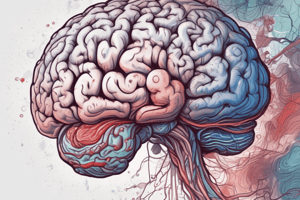Podcast
Questions and Answers
Which category of causes does hematogenous spread of septic emboli to the cerebrum fall under?
Which category of causes does hematogenous spread of septic emboli to the cerebrum fall under?
- Hematogenous spread (correct)
- Neurosurgical procedures
- Unknown causes
- Direct extension
What is a common symptom associated with brain abscesses that is typically related to meningeal irritation?
What is a common symptom associated with brain abscesses that is typically related to meningeal irritation?
- Hemiparesis
- Fever
- Nausea
- Photophobia (correct)
Which diagnostic technique is commonly used to identify brain abscesses by visualizing detailed images of the brain tissue?
Which diagnostic technique is commonly used to identify brain abscesses by visualizing detailed images of the brain tissue?
- Magnetic resonance imaging (MRI) (correct)
- Blood test
- X-ray
- Urine analysis
What are some complications associated with brain abscesses?
What are some complications associated with brain abscesses?
Which nursing intervention is crucial for a patient with a brain abscess experiencing neurological deficits?
Which nursing intervention is crucial for a patient with a brain abscess experiencing neurological deficits?
Flashcards are hidden until you start studying
Study Notes
Brain Abscess
A brain abscess is a collection of pus within the brain tissue caused by infection. It most commonly occurs due to bacterial, fungal, parasitic, or viral organisms entering the bloodstream and spreading through it until it reaches the central nervous system.
Causes
The primary causes of a brain abscess can be classified into three categories: hematogenous spread, direct extension from adjacent structures, and neurosurgical procedures. Hematogenous spread usually results from thromboembolism of septic emboli to the cerebrum, while direct extension typically arises from nearby structures such as teeth or sinuses. Neurosurgical procedures involve infections associated with ventriculoperitoneal shunts or during invasive neurological surgeries.
Symptoms
Symptoms may vary depending on the location and size of the abscess, but they often include fever, headache, meningitis, seizures, nausea, vomiting, focal neurologic deficit, hemiparesis, and mental changes. Meningeal irritation signs, such as photophobia and nuchal rigidity, are less common.
Diagnosis
Diagnostic techniques used to identify brain abscesses include magnetic resonance imaging (MRI), CT scans, contrast studies, and cerebrospinal fluid analysis. Positive findings in these tests, along with clinical symptoms, aid in accurate diagnosis.
Complications
Complications associated with brain abscesses include intracranial hypertension, neurological deficits, and hydrocephalus. The infection may also spread further into the brain, leading to brainstem dysfunction, stroke, or even death.
Nursing Management
Nursing management for patients with brain abscesses should focus on maintaining a patent airway, stabilizing neurological status, managing seizures, and controlling infection. Supportive care, such as sedation for agitation, pain management, and monitoring vital signs, is also crucial. Regular neurological assessments and prompt intervention for any changes in the patient's condition are essential.
Studying That Suits You
Use AI to generate personalized quizzes and flashcards to suit your learning preferences.




